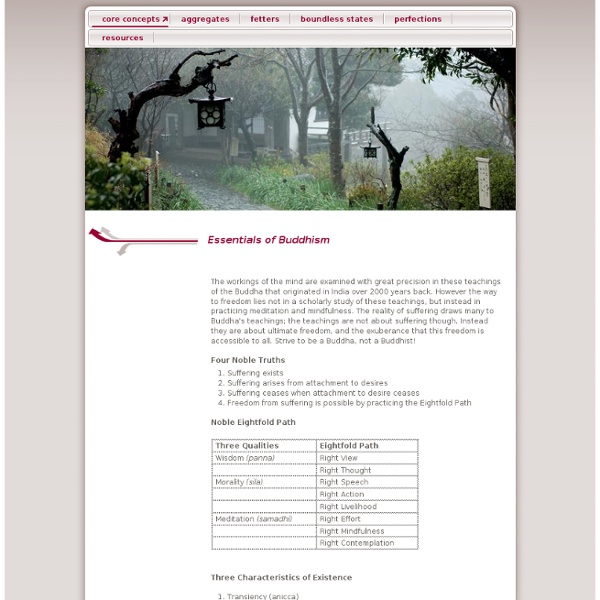FOUR NOBLE TRUTHS - StumbleUpon
The Four Noble Truths represent the core of the teachings of the Buddha, and are as follows: The First Noble Truth - dissatisfaction and suffering exist and are universally experienced. The Second Noble Truth - Desire and attachment are the causes of dissatisfaction and suffering. The Third Noble Truth - There is an end to dissatisfaction and suffering. The Fourth Noble Truth - The end can be attained by journeying on the Noble Eight-fold Path.
Buddhism and the God-idea
Do Buddhists believe in a god? No, we do not. There are several reasons for this. The Buddha, like modern sociologists and psychologists, believed that religious ideas and especially the god idea have their origins in fear. The Buddha says: Gripped by fear people go to sacred mountains, sacred groves, sacred trees and shrines.
Buddhist Beliefs Explained
Sangha is the word for the community of Buddhists; those people seeking enlightenment by practicing the Dharma. Buddha said that the only way to realize the Dharma was in community, so the Sangha is an important part of this process. So Buddhists take refuge by a respectful repeating of this word “Sangha”. Dhammapada, wrote sometime between 188-192 They go to many a refuge,to mountains, forests, parks, trees, and shrines:people threatened with danger.That's not the secure refuge,that's not the highest refuge,that's not the refuge, having gone to which, you gain release from all suffering and stress.
BEGINNER'S GUIDE ...
© 1995 Dharman Craig PressonAll Rights Reserved “Zen is not what you think!” -- anonymous Preface The purpose of this little book is to assure that all studentsunderstand the mechanics of Zen practice and the basic teachings ofBuddhism.
Buddhism: a diagram
I created this diagram to assist my future posts on Buddhist themes. Below are links and texts to help explain the outline. It is my hope that this diagram aids the reader in visually organizing the dharma (the Buddha’s teachings) in a way that makes it easier to remember, question and discuss.
How to Meditate - Guided Meditation Techniques - Buddhist Meditations
I Tre Principi dell’Insegnamento - The Mirror - Italian Edition
Estratto dall’ insegnamento dato da Chögyal Namkhai Norbu a Merigar West il 10 luglio 2016 Quando seguiamo qualsiasi tipo di insegnamento dobbiamo comprendere che ci sono sempre tre principi, altrimenti non riusciremo a capire che tipo di insegnamento sia e che beneficio possiamo avere. Questo non per giudicare se un insegnamento è migliore di un altro, ma è molto importante perché, se stiamo seguendo un insegnamento, dobbiamo comprenderne le caratteristiche, che dipendono dalla situazione. L’insegnamento va in accordo con le capacità di una persona, proprio come una medicina: per esempio, alcuni sono più interessati [all’insegnamento], altri hanno maggiori o minori capacità, altri ancora hanno una maggiore o minore conoscenza ecc… Quando siamo ammalati non possiamo prendere una medicina qualsiasi.
"Nope, I didn't say that." — The Buddha
Buddhism: 11 Common Misunderstandings and Mistakes
People believe many things about Buddhism that simply are incorrect. They think Buddhists want to get enlightened so they can be blissed out all the time. If something bad happens to you, it's because of something you did in a past life. Everybody knows that Buddhists have to be vegetarians. Unfortunately, much of what "everybody knows" about Buddhism isn't true.



